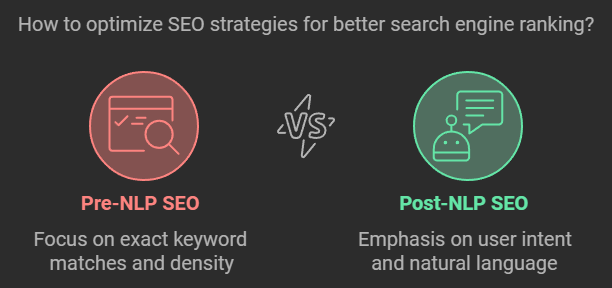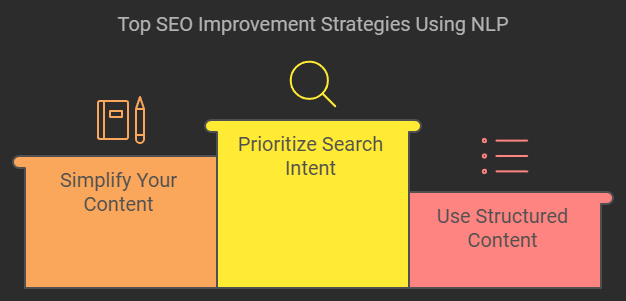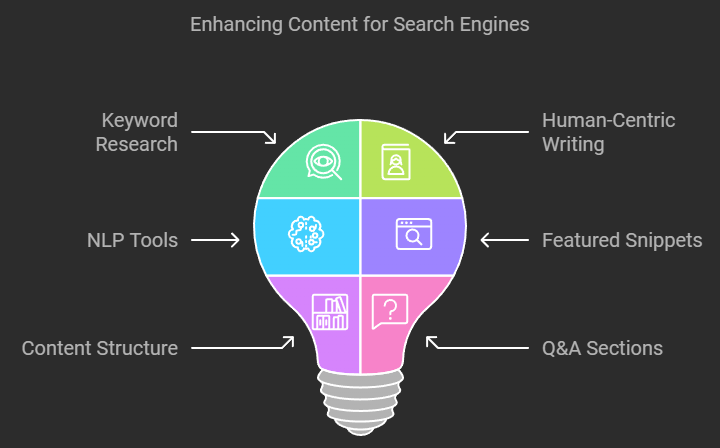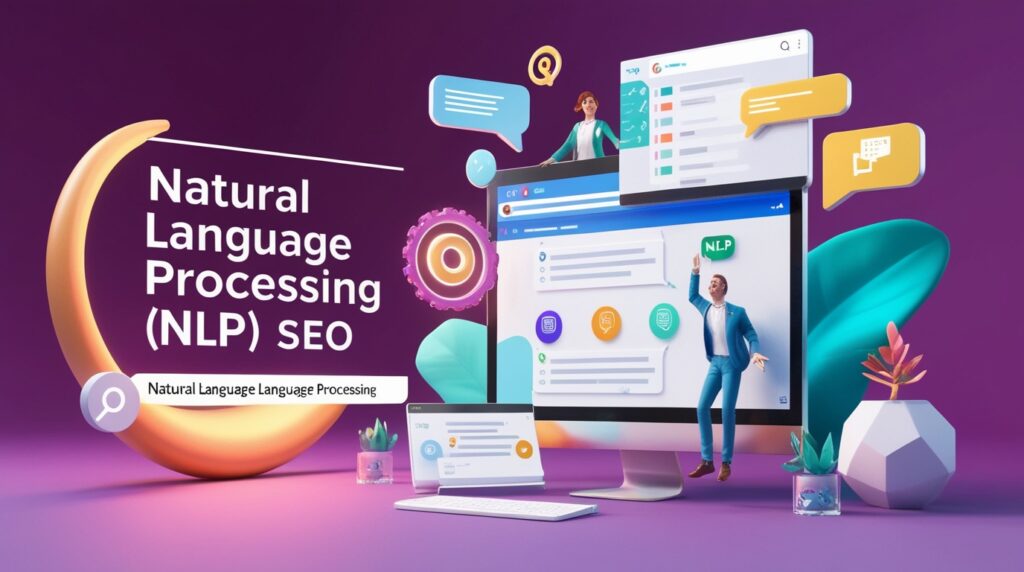Search engines are rapidly becoming more intelligent, and the driving force behind this transformation is Natural Language Processing (NLP). This technology helps computers understand human language—what we say, how we say it, and even what we mean. It significantly improves Search Engine Optimization (SEO), making search engines better at matching content to what people are actually looking for.
If you’re trying to get your website noticed, learning about NLP and how it works in SEO can help you create content that ranks higher and connects better with your audience. Let’s break it down step by step.
What is NLP in Simple Terms?
In simple terms, NLP is how computers learn to understand human language. Whether it’s a written sentence or spoken words, NLP helps machines figure out what we mean, even if we’re not very precise.
For example, if you search for “best pizza near me”, NLP doesn’t just match the words “pizza” and “near me”. It also figures out that you’re looking for restaurants close by that serve high-quality pizza.
NLP is a branch of Artificial Intelligence (AI) that enables machines to understand, interpret, and respond to human language. It’s like teaching computers how to “speak human.”
Imagine typing a search like “best Italian food near me.” Instead of matching exact words, NLP deciphers the context:
- You’re searching for restaurants, not recipes.
- “Near me” signals a need for local results ().
How NLP Works for Search Engines

Let’s simplify the process:
- User Query: A person types or speaks a search like “Best vegan desserts near me”.
- Text Breakdown: NLP breaks the query into words and analyzes them.
- Intent Recognition: It identifies the user’s intent—are they looking for recipes, restaurants, or a store?
- Semantic Understanding: It matches the query with relevant results, even if the exact words aren’t present.
This nuanced understanding is the reason why search results have become so much more accurate and helpful in recent years.
NLP’s Role in Modern SEO
NLP has transformed the way search engines rank content, focusing on:
- User Intent: Search engines now prioritize what a user is really looking for.
- Content Quality: Instead of keyword stuffing, the focus is on providing meaningful, relevant, and well-written content.
- Semantic Search: Queries are matched with results based on meaning, not just specific words.

Comparison: SEO Before and After NLP
| Aspect | Pre-NLP SEO | Post-NLP SEO |
|---|---|---|
| Keyword Matching | Exact keyword matches were essential. | Synonyms and context are prioritized. |
| User Intent | Often misunderstood by search engines. | Intent is the cornerstone of ranking. |
| Content Focus | Focused on keyword density. | Prioritizes relevance and clarity. |
| Voice Search | Struggled with conversational language. | Optimized for natural, spoken queries. |
Key Benefits of NLP in SEO
- Improves Search Relevance: Matches content to user intent, not just keywords.
- Enhances Readability: Rewards clear, structured content.
- Boosts Featured Snippet Potential: Optimized content is more likely to appear in snippets.
- Supports Voice Search: Interprets conversational queries better.
But… Before moving to the process of implementing NLP in SEO, let’s understand what the heck is this NLP 😀
How NLP Works
Let’s break down how NLP transforms user queries into actionable search results:
| Step | What Happens? |
|---|---|
| 1. Query Input | Users enter a search query (e.g., “best budget-friendly handmade gifts”). |
| 2. Text Analysis | NLP splits the query into components (keywords, context words) and identifies intent (looking for affordable options). |
| 3. Semantic Match | Recognizes synonyms, related terms, and context (e.g., “affordable” = “budget-friendly”). |
| 4. Results Delivery | Shows content that best answers the query, even if exact keywords aren’t present. |
Real-World Examples of NLP in SEO
Here’s how NLP works in action, using a website selling handmade jewelry:
| Use Case | How NLP Helps | Example |
|---|---|---|
| Understanding Intent | Recognizes when a query like “unique handmade rings” seeks custom-crafted items. | User searching for “handmade gifts” will find your unique jewelry website. |
| Keyword Suggestions | Suggests related keywords based on search behavior. | Adds terms like “artisan necklaces” or “custom bracelets”. |
| Semantic Search | Matches synonyms to broaden search relevance. | “Handmade jewelry” equals “custom-crafted accessories”. |
| Voice Search Support | Interprets conversational queries accurately. | Someone says “Where can I buy custom necklaces?” and your site appears if optimized for such terms. |
| Featured Snippets | Highlights optimized content as quick answers at the top of search results. | A blog titled “How to Choose the Perfect Handmade Gift” gets featured in Google snippets. |
📈Statistics: The Numbers Don’t Lie
| Statistic | Significance for SEO |
|---|---|
| 91% of content | Is influenced by Google’s NLP-based algorithms to prioritize user intent. |
| 15% of daily searches | Are new, requiring NLP to interpret unfamiliar queries. |
| Featured snippets | Generate 8% higher click-through rates, often powered by NLP-optimized content. |
| Voice search usage | Expected to grow to 55% of all searches by 2025, relying heavily on NLP for conversational understanding. |
How to Use NLP to Improve SEO

Integrating NLP into your SEO strategy can be a game-changer, boosting your rankings and significantly enhancing the user experience. Here are some powerful tips and techniques for effectively incorporating NLP into your content:
Prioritize Search Intent
Focusing on search intent is crucial. Search engines are evolving beyond simple keyword matching to understanding user intent. By grasping what users truly want from their searches, you can create more relevant and valuable content. Begin by analyzing the motivations behind common queries related to your topic. Are users seeking information, products, or solutions to a problem?
For example, with the query “budget-friendly handmade gifts,” simply using keywords like “affordable” and “gifts” isn’t enough. Instead, offer targeted advice on where to buy or how to make high-quality handmade gifts that are budget-friendly. This approach directly addresses the user’s needs and provides meaningful context.
Simplify Your Content
Clear and straightforward language is essential for improving readability, making your content more accessible for both users and search engines. Use short, digestible sentences, and avoid complex vocabulary. Aim for a conversational tone that is natural and approachable. This not only enhances user experience but also helps search engines parse your content more accurately.
Use clear, simple language and add local keywords like city names or neighborhoods. For example, “Handmade gifts in [City]” instead of just “handmade gifts.” This improves readability and local SEO.
Use Structured Content
Structured content plays a vital role in helping search engines understand and rank your pages effectively. It also improves user experience by organizing your content into scannable, easily digestible sections. Break your content into manageable sections using headings (H1, H2, H3), subheadings, bullet points, numbered lists, and short paragraphs.
For example, a guide on “Choosing the Right Handmade Gifts” could be structured like this:
- What Makes a Good Handmade Gift?
- Where to Buy Handmade Gifts
- Affordable Handmade Gift Ideas
This structure not only enhances navigation but also signals to search engines that your content is relevant and well-organized.
Include Entities
NLP helps search engines understand the relationships between entities—specific people, places, things, or concepts—within your content. By including entities, you enable search engines to grasp the context of your content and link it to relevant queries. Research the most pertinent entities for your topic and integrate them naturally into your content.
For example, if your topic is handmade jewelry, ensure you incorporate relevant entities like “gold,” “artisan,” “custom designs,” and specific gemstones such as “sapphire” or “emerald.” These entities add depth and clarity to your content and help search engines make connections between related concepts.
Optimize for Featured Snippets
Featured snippets are the highlighted answers that appear at the top of some search results, drawing attention and driving higher click-through rates. These snippets often result from NLP’s ability to interpret content clearly. To increase your chances of being featured, provide concise, direct answers to common questions. Use bullet points, numbered lists, or tables to present your information in a structured, easily digestible format.
For example, if addressing “how to make a handmade gift,” respond clearly with a simple outline:
- Step 1: Choose a material (wood, fabric, clay)
- Step 2: Create a design
- Step 3: Assemble and finish the gift
Leverage NLP Tools
Utilizing NLP-powered tools is essential for analyzing and improving your content to ensure it aligns with SEO best practices. These tools can offer keyword suggestions, identify semantic gaps, and assess how well your content meets user intent.
Consider using tools like:
- Google’s NLP API: This tool analyzes your content and provides insights on entities, sentiment, and structure, helping you optimize it for search engines.
- SEOptimer: This comprehensive tool provides keyword insights, search volume, and competitive analysis, allowing you to target relevant queries based on NLP’s pattern recognition.
By incorporating these NLP-driven strategies into your SEO practices, you can enhance your content’s relevance, clarity, and performance in search engines. The growing influence of NLP in SEO highlights the importance of creating content that not only uses the right keywords but also speaks directly to your audience’s true intent.

6 Ways to Implement NLP in Your SEO Strategy
Here’s how you can integrate NLP into your content strategy to boost rankings:
1. Conduct Intent-Focused Keyword Research
Use tools like SEMRush or Google Keyword Planner to uncover keywords that align with user intent. Focus on variations of main keywords that better capture intent.
| Main Keyword | Intent-Based Variations |
|---|---|
| Handmade Jewelry | Custom necklaces, affordable jewelry |
| Vegan Desserts | Dairy-free cakes, gluten-free sweets |
2. Write for Humans, Not Just Machines
Create conversational, simple content. Avoid overly technical jargon or robotic phrasing. For example, instead of “purchase handcrafted accessories,” write “buy beautiful handmade jewelry you’ll love.”
3. Use NLP Tools
Google’s Natural Language API Demo is a fantastic way to analyze your content. It shows:
- Entity recognition.
- Sentiment analysis.
- Syntax and structure analysis.
4. Optimize for Featured Snippets
Featured snippets are prime real estate on Google. Provide direct, concise answers to common questions.
- Use bullet points, numbered lists, or tables.
- Example: Create a table comparing handmade vs mass-produced gifts.
| Feature | Handmade Gifts | Mass-Produced Gifts |
|---|---|---|
| Uniqueness | Each item is one-of-a-kind. | Identical to many others. |
| Craftsmanship | High attention to detail. | Factory-made. |
| Price | Slightly higher. | Often cheaper. |
5. Structure Your Content
Use headings, subheadings, and short paragraphs. A logical structure helps both search engines and readers understand your content.
6. Answer Common Questions
Include Q&A sections to target People Also Ask (PAA) results.
Best Practices for NLP-Optimized Content
| Practice | Why It Works |
|---|---|
| Focus on Relevance | Search engines prioritize content that aligns with user intent. |
| Readable Formatting | Improves user experience, boosting engagement metrics. |
| Keep Content Updated | Fresh content aligns with current trends, improving visibility. |
| Internal Linking | Strengthens site navigation and helps Google understand content connections. |
Why NLP is the Future of SEO
Natural Language Processing is more than just a trend—it’s shaping the future of how we search and interact online. By focusing on user intent, creating structured content, and leveraging tools like Google’s NLP API, you can stay ahead in the SEO game.
Ready to embrace NLP? Start small by analyzing your current content, and you’ll soon see the impact on your rankings and user engagement!
Conclusion
Natural Language Processing (NLP) is more than a technological advancement; it’s a transformative force in SEO. By enabling search engines to understand human language better, NLP ensures that content aligns more closely with user intent and needs.
For content creators, this means prioritizing quality, structure, and relevance. Using tools like Google’s NLP API and applying best practices, businesses can create content that not only ranks but also resonates. Whether you’re targeting niche markets or broad audiences, NLP is your key to thriving in an ever-evolving SEO landscape.
Start leveraging NLP today to elevate your SEO strategy and secure your place at the top of search results.










